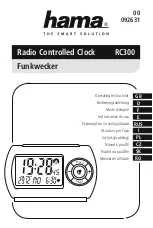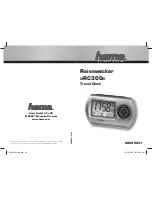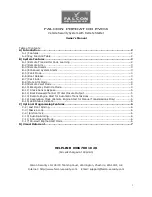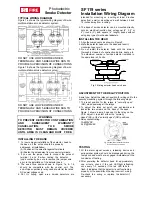
Illustration
Location of controls
1 Speaker
2
Time button
3
Hour/MSF button
4
Snooze button
5
Minute button
6
Alarm button
7
LED clock display
8
Alarm 1 indicator
9
Alarm 2 indicator
10
PM indicator
11
Battery compartment
(located underneath unit)
Switching on and setting the clock time
Before you start using your alarm clock, you must start by setting the clock to the
correct time.
1
Place the unit on a flat surface. Plug the mains plug into the wall socket
and switch on the wall socket.
Automatic MSF clock setting
2
The LED clock display will count up from 00 to 59 several times and will then
set the time automatically using the MSF signal that it receives from the
national physical laboratory at Rugby.
Manual clock setting
3
If you wish to set the time manually, press and release the TIME button (2) to
change the mode. Press and hold theTIME button and simultaneously hold
down the HOUR/MSF button (3) or the MINUTE button (5). The LED clock
display will fast forward the minutes and hour segments. Release the TIME
button (2) when your desired time is set.
4
The PM indicator (10) will illuminate to indicate 12.00 midday has been
reached.
By holding the hour button down, the hour will advance by 5 hours.
Note : In this mode, the unit will not be able to receive the automatic MSF
signal.
Setting the alarm 1 time
1
Press the ALARM button (6) once in time mode. ‘AL 01’ will display.
As the alarm button is released the previous alarm time will display.
2
Repeatedly press the SNOOZE to select the desired type of alarm as
follows:
Note : The default type of alarm is daily (dY17)
MSF radio controlled
alarm clock
28023
OPERATING INSTRUCTIONS
Electrical requirements
Check that the voltage on the rating plate of your alarm clock corresponds
with your house electricity supply which must be A.C. (Alternating current).
For alarm clocks with fitted plug.
If the socket outlets in your home are not suitable for the plug supplied
with this appliance the plug should be removed and the appropriate one
fitted.
IMP0RTANT : THE PLUG REMOVED FROM THE MAINS LEAD, IF SEVERED,
MUST BE DESTROYED AS A PLUG WITH A BARED FLEXIBLE CORD IS
HAZARDOUS IF ENGAGED INTO A LIVE SOCKET OUTLET.
Should the fuse in the 13 amp mains plug require changing a 3 amp BS1362
fuse must be fitted.
The socket outlet should be installed near the equipment and shall be easily
accessible.
P.2
P.3
P.4
Battery back-up facility
(unit will work without batteries being fitted)
Your alarm clock is equipped with a battery back-up facility.
1
Remove the battery compartment cover (located underneath the unit) by
pushing in the clip and lifting off.
2
Insert 3 x AA size 1.5V batteries and connect to terminals (Ensure
the batteries are inserted correctly).
3
Replace the battery compartment cover. (Batteries not supplied).
Should a power interruption occur the clock will continue to run, however, time
keeping will not be accurate. The display will be extinguished to conserve battery
life but the memory will retain details of the clock time and alarm settings.
If the optional battery is not installed in case of the AC power failure when power is
restored, the clock will go through the automatic msf clock setting. You will need to
set the alarm.
Battery back-up is designed to operate for a short period only.
If the unit is not to be used for a prolonged period, remove the battery to
avoid battery leakage.
In the interests of environmental safety : dispose of batteries safely.
Type of
alarm
LED display
DAILY
dY17
WEEKDAY
dY15
WEEKEND
dY67
Disabled
--:--
AL1
AL2
PM
TIME
HOUR
MSF
MINUTE
ALARM
SNOOZE
1
2
3
4
8
6
7
5
○○
1 1
1 0
9




















